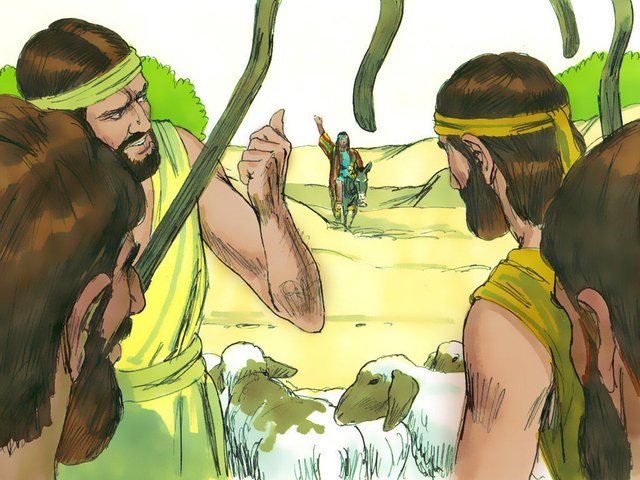Was Yosef the First Biblical Adolescent?

In using the word na’ar to describe the ill reports Yosef delivered to his father, does the Torah depict Yosef as the first biblical teen?
If we pose the problem literally, the answer is obviously yes. Yosef was, after all, 17 years old. But our question runs deeper: did Yosef act with the characteristics we generally associate with adolescence today?
We’ll see that this partly depends on how we evaluate adolescence - and especially whether we focus on its challenges or also consider its positive dimensions. But first we must consider the verse in which Yosef is called a na’ar:
“These are the generations of Jacob: At seventeen years of age, Yosef tended the flocks with his brothers. And he was a na’ar to the sons of his father’s wives Bilhah and Zilpah. And Yosef brought their ill reports to their father.”
Needless to say, the verse’s meaning is obscure: Is na’ar used as a verb or noun? What does the word mean in this context? What does ill reports (dibbah ra’ah) refer to? Whose dibbah ra’ah did he bring? Was Yosef well-intentioned in bringing the dibbah to Yaakov?
The meaning of the word na’ar is subject to a wide variety of interpretations in the scholarly literature generally and in our context specifically. As noted by Steven Wilson in his important 2015 book Making Men, a number of biblical scholars have sought to dissociate the word na’ar from any association with a particular age, instead connecting na’ar with a particular military rank (a sort of pre-medieval squire), a personal attendant to someone of higher rank, or a member of the priesthood. But as Wilson convincingly argues, while the word na’ar or na’arah clearly has application in numerous contexts, a convincing case can be made that it refers to an individual who is twenty years old or below. In short, whether or not the term carries additional connotations, at minimum na’ar is associated with a male youth who has not yet reached adulthood.
The question of the na’ar’s association with youth helps us to frame the commentators’ reading of our passage. Some dissociate the word na’ar in our verse entirely from youth. Rashbam, for example, understands it to mean that Yosef liked the maidservants’ children. Ibn Ezra and Ralbag see na’ar as suggesting that Yosef served these siblings. A slew of midrashim, followed by Rashi, understand that Yosef acted youthfully in his obsession with his appearance, even though he no longer technically qualified as a child by biblical standards.
But the majority of commentators take the term at face value, rendering the verse as indicating that Yosef, who was young and therefore not considered prominent, spent time with the maidservants, who were considered less prestigious than Leah’s children.
Following this line, a number of commentators suggest that Yosef’s youth not only accounts for his social acquaintances, but also for his decision to share the reports with his father. Tur, for instance, notes that the numerical value of na’ar (320) is the same as shoteh, a fool. The implication is that Yosef acted foolishly due to his youth. Seforno goes further, explicitly castigating Yosef for “sinning by bringing the negative reports of his brothers, for he was inexperienced (see I Samuel 17:39) and did not consider the consequences of the matter.”
But others, while attributing Yosef’s rash behavior to his youthfulness, refrain from issuing criticism. Hizkuni, for example, simply remarks: “And do not wonder why he brought their negative reports to their father, for he was a na’ar.” Numerous commentators similarly maintain that Yosef should not be judged overly harshly due to his youth (we might say adolescence).
Still others take this line of thought a step further, emphasizing that Yosef was positively motivated in his decision to share the report with his father. Rashbam seems to gesture in this direction, emphasizing that he emphasized to his father that he himself strives to treat the maidservants’ children with the utmost respect. R. Yaakov Zvi Mecklenberg picks up on a similar thread, noting that “Yosef did not act like most rumor-mongers,” who seek to shame their friends. Yosef’s intentions were to enable his father to redirect the brothers’ hurtful behavior. And Malbim and R. David Zvi Hoffman contend that the fact that Yosef only brought the brothers’ words to their father suggests that this contains something of a justification for Yosef’s actions. “His intentions,” R. Hoffman concludes, “were for good.”
Taken together, these commentaries portray a striking picture of an adolescent boy - one that is distant from the doom and gloom manner in which teens are often portrayed. (Or, as one parent put it to me, “Will the Martians ever send him back?”)
In his fascinating new book Why Smart Teens Hurt - a must read for parents and teachers of teens alike - author Eric Maisel does a brilliant job portraying the very real experience of teenagers, enabling us to better appreciate Yosef’s motivation as an adolescent. He notes that adolescents often cannot simply ignore untruths or wrongdoings: “Her smarts supply her with a penetrating gaze, she sees what she sees, she finds that spectacle intolerable and she must either bravely respond herself by not responding.”
In other words, many teens possess an allergy to an emperor with no clothes, and are doubly perturbed by the fact that no one else around them seems to notice or care about injustice. Teens can become so engulfed by the desire for righteousness that they over incline toward speaking out in the desire to seek justice. Yosef, of course, was somewhat cautious; he held his tongue and shared the ill reports only with his father, likely with idealistic intentions. Still, his judgment was mistaken and his decision hasty, and his actions backfired.
Yes, Yosef made mistakes and lacked the self-control or forethought to hold his tongue. But he was also a model fierce commitment to justice and protectiveness toward the vulnerable. These characteristics paved the way for him to develop into an adult who thrived as a leader of households and governments alike, refused the allure of seduction, and remained committed to his faith even while in the throes of exile.
Yosef was indeed the Bible’s first teenager. Notwithstanding his impetuousness, he was the first biblical adolescent - and, for precisely that reason, has much to commend to us about adolescents today.
